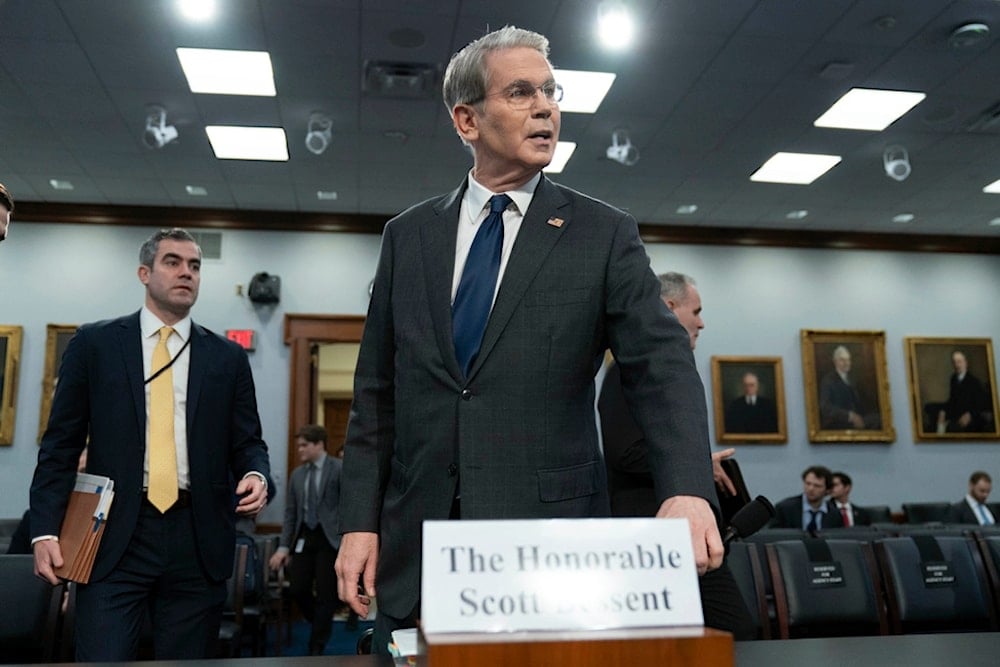Bessent contradicts Trump as China trade talks remain absent
The Chinese Foreign Ministry has also rejected Trump's version of events, stating that the two countries have not engaged in any consultations or negotiations regarding tariffs.
-

Treasury Secretary Scott Bessen arrives to testify before the House Committee on Appropriations, Subcommittee on Financial Services and General Government, oversight hearing of the US Department of the Treasury on Capitol Hill in Washington, Tuesday, May 6, 2025. (AP Photo/Jose Luis Magana)
US Treasury Secretary Scott Bessent on Tuesday contradicted President Donald Trump's repeated claims that trade negotiations with China are underway, telling lawmakers that no such discussions have begun.
"We have not engaged in negotiations with [China] as of yet," Bessent said during testimony before the House Appropriations Committee.
Although the Trump administration is allegedly actively pursuing trade agreements with 17 of its 18 largest trading partners, Bessent confirmed that China is not among them. He expressed confidence that most of those deals could be concluded by the end of the year. His comments directly undercut President Trump's public statements asserting progress with Beijing, including his claim that Chinese President Xi Jinping had personally reached out to initiate talks.
The Chinese Foreign Ministry has also rejected Trump's version of events, stating that the two countries have not engaged in any consultations or negotiations regarding tariffs. China's Commerce Ministry noted that any future engagement would require the US to first scale back its tariff measures, which currently stand at 145% on Chinese imports.
Tariff resilience
Despite the absence of formal dialogue, new figures from the Chinese Ministry of Transport show that trade flows remain surprisingly strong. In the week ending April 27, Chinese ports handled 6.7 million containers, a 7% increase from the same period last year. Air cargo volumes also rose by 30%, with much of the surge attributed to accelerated shipments from e-commerce platforms like Temu and Shein.
These companies took advantage of the now-closed "de minimis" loophole, which had allowed small-value parcels under $800 to enter the US duty-free. The exemption was revoked by the Trump administration on May 2 as part of a broader effort to close regulatory gaps and curb what it calls unfair trade practices.
Read more: Yuan surges past 7.2 as hopes grow for US-China trade talks
Still, the impact of heightened tariffs is beginning to show. Ship tracking data compiled by Bloomberg revealed a sharp drop in the number of cargo ships leaving Chinese ports for the US, down from 73 in early April to 47 later in the month. Companies like Mattel have already responded by announcing price hikes for US consumers, citing rising costs from the new duties.
Trade uncertainty
Economists forecast that China's official April export data, due later this week, will show modest growth of around 2.5% year-on-year, a slowdown from the 12% jump recorded in March but still indicative of short-term resilience. Analysts warn, however, that prolonged tariff escalation could dampen export momentum in the second half of 2025.
The disconnect between Trump's rhetoric and statements from both his own Treasury Secretary and Chinese officials underscores deep uncertainty surrounding the administration's trade policy. While both sides express openness to eventual talks, no formal negotiations have taken place, and the economic and diplomatic fallout is already taking shape.
Read more: US should stop threatening China if it truly seeks dialogue: Diplomat

 3 Min Read
3 Min Read








